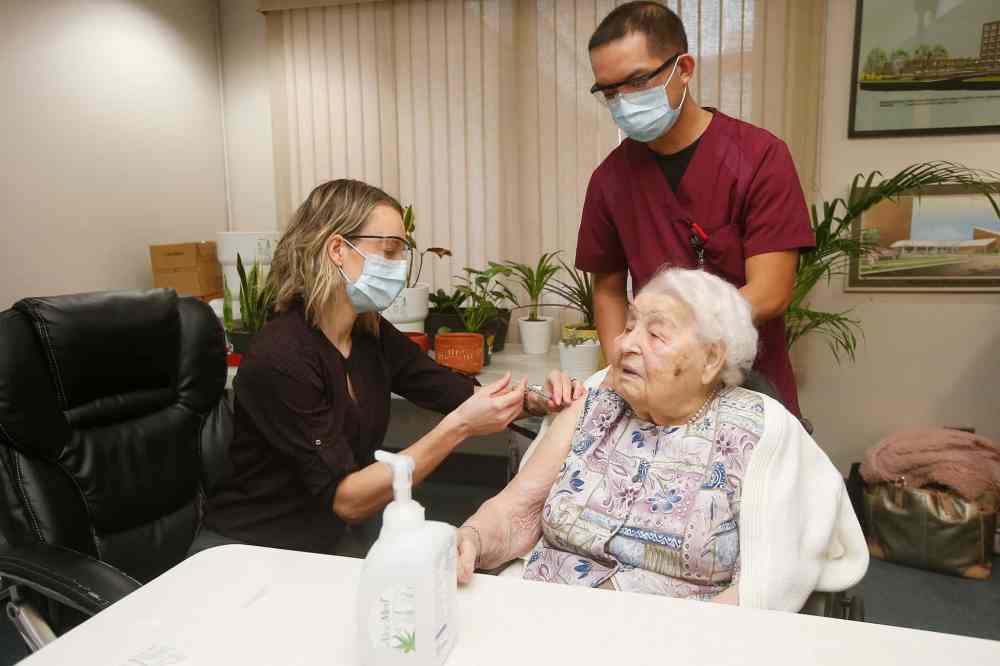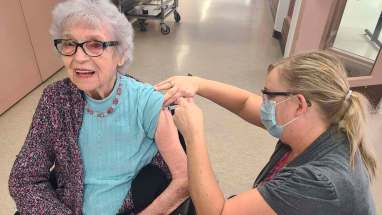If we’re going with science, inoculate the elderly… period
Read this article for free:
or
Already have an account? Log in here »
To continue reading, please subscribe:
Monthly Digital Subscription
$0 for the first 4 weeks*
- Enjoy unlimited reading on winnipegfreepress.com
- Read the E-Edition, our digital replica newspaper
- Access News Break, our award-winning app
- Play interactive puzzles
*No charge for 4 weeks then price increases to the regular rate of $19.00 plus GST every four weeks. Offer available to new and qualified returning subscribers only. Cancel any time.
Monthly Digital Subscription
$4.75/week*
- Enjoy unlimited reading on winnipegfreepress.com
- Read the E-Edition, our digital replica newspaper
- Access News Break, our award-winning app
- Play interactive puzzles
*Billed as $19 plus GST every four weeks. Cancel any time.
To continue reading, please subscribe:
Add Free Press access to your Brandon Sun subscription for only an additional
$1 for the first 4 weeks*
*Your next subscription payment will increase by $1.00 and you will be charged $16.99 plus GST for four weeks. After four weeks, your payment will increase to $23.99 plus GST every four weeks.
Read unlimited articles for free today:
or
Already have an account? Log in here »
Hey there, time traveller!
This article was published 11/02/2021 (1761 days ago), so information in it may no longer be current.
Public health officials could have some explaining to do if inmates in provincial jails and residents of homeless shelters receive COVID-19 vaccines before elderly Manitobans.
As shipments of the Pfizer-BioNTech vaccine begin to ramp up again next week following a global supply disruption, decisions about who is next in line for the life-saving jabs will move further into the spotlight.
Manitoba has, for the most part, been following recommendations from the National Advisory Committee on Immunization by vaccinating health-care workers and seniors in long-term care facilities first. The province also shipped thousands of doses to First Nations to ensure adult Indigenous people in remote communities (identified by NACI as high risk) are part of the first-stage rollout.
However, Manitoba has deviated from NACI recommendations in one key area: when to start vaccinating people over the age of 80 who do not live in congregate settings, such as nursing homes.

Dr. Joss Reimer, medical lead with Manitoba’s COVID-19 vaccine implementation task force, said vaccine priority will be based on “science,” including who is at highest risk of dying from the disease. Age is by far the most important determinant, she said. People over 70 have eight times the risk of serious illness compared with younger people. About one in five people over 70 who contract COVID-19 die from it.
“We don’t see those high numbers in other groups,” said Reimer.
Despite that, Manitoba’s vaccine rollout plan could see lower-risk people in congregate settings, such as provincial jails and homeless shelters, get vaccinated before the elderly.
NACI recommends provinces start immunizing the general population over 80 during the first stage of vaccinations. Manitoba rejected that recommendation. Under its plan, that group won’t get shots until Stage 2, expected to begin in April. That’s the same time frame in which people in jails and shelters are scheduled to be immunized.
Manitobans over 70 outside congregate settings aren’t expected to be vaccinated until the third stage.
That doesn’t jibe with the “science” Reimer spoke about.
NACI recommends provinces start immunizing the general population over 80 during the first stage of vaccinations. Manitoba rejected that recommendation. Under its plan, that group won’t get shots until Stage 2, expected to begin in April.
She said corrections facilities also have a high percentage of Indigenous inmates, who are at greater risk of severe outcomes from the disease. That’s why they’ve been deemed a higher priority. However, there is no evidence that group is at greater risk than people over 70.
Reimer reminded Manitobans that public-health officials do not make value judgments about people when deciding who gets immunized first. Inmates and people living in homeless shelters are no less deserving of life-saving medical intervention, she said.
It was an important message, given the potential to politicize the immunization process. Federal Conservative leader Erin O’Toole and Ontario Premier Doug Ford both criticized the federal government last month for inoculating a small percentage of high-risk federal inmates, suggesting “criminals” should not get priority access.
Discussions around vaccine priority should be based on scientific evidence and the principles set out by NACI. After preserving health-care capacity, protecting those at highest risk of severe illness from COVID-19 should be the top priority, no matter who they are or where they live.
The general population in provincial jails and shelters do not fit that criteria. That’s not a moral judgment, it’s a scientific reality.
Teachers, jail guards and other essential workers — many of whom have been lobbying for priority access to vaccines — don’t fall into the highest-risk category, either.
That does not reflect the value of their profession, or their risk of contracting the disease. It simply means as a group, they are not at the highest risk of dying from COVID-19; the elderly are.
Manitoba has not done a good job of protecting seniors during the pandemic. We have the second-highest COVID-19 deaths per capita in the country. Let’s not make it worse with a misguided immunization program.
tom.brodbeck@freepress.mb.ca

Tom has been covering Manitoba politics since the early 1990s and joined the Winnipeg Free Press news team in 2019.
Our newsroom depends on a growing audience of readers to power our journalism. If you are not a paid reader, please consider becoming a subscriber.
Our newsroom depends on its audience of readers to power our journalism. Thank you for your support.




